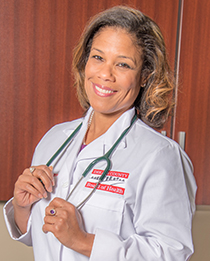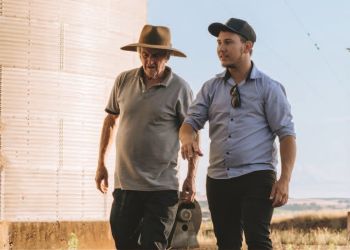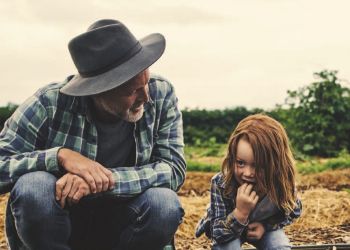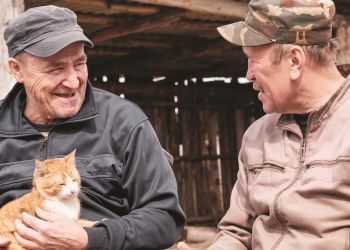 Interview by Taylarr Lopez, Communications Specialist, NACCHO
Interview by Taylarr Lopez, Communications Specialist, NACCHO
NACCHO’s Member Spotlight series features interviews with local health department leaders and staff about their careers in public health. This interview features Sandra Ford, MD, MBA, FAAP, District Health Director and CEO of District 3, Unit 5 DeKalb County Board of Health in Georgia. She is also a member of NACCHO’s Board of Directors. Below, she shares how her department was the first in the state to implement a wellness policy, which encourages staff members to be active during the day, and highlights the successes of the Mothers Offering Resources and Education (MORE) Moms programs.
Tell us about your career path in public health.
I received my bachelor’s degree in psychology from Stanford University, then I went on to obtain a medical degree from Howard University’s College of Medicine, and a master’s degree in business administration (MBA) with a concentration in health services administration from Howard’s Graduate School of Business. Working as a faculty member at Howard University Hospital in Washington, D.C. afforded me the opportunity to take courses at Howard’s business school and learn the business side of healthcare. That coursework was incredibly beneficial and important to me, because in my opinion, it seems that many primary care physicians don’t have an opportunity to learn about the business side of medicine. For me, it was very exciting, because it felt like I was learning another language.
During my time as an attending physician and assistant professor at Howard, I was offered a leadership position with the Florida Department of Health, where I had to manage a $350 million budget and be lead executive to over 700 staff members. Being in that position made me realize that there’s so much influence one could have from a public health standpoint. Lives change when policies change and these changes often affect whole communities.
What are some of the highlights of your career in public health? What makes the work that you do worthwhile?
The initiative I’m most proud of is the Mothers Offering Resources and Education (MORE) Moms Program developed to address infant mortality issues in DeKalb County. The program has proven to be so successful that it has now expanded into a full a maternal child health program. Through this initiative, we have partnered with Emory University to train our resource moms to be doulas to provide support for the mothers in our program. In the future, we hope to establish a residential facility where mothers who have just given birth can stay for a year to receive job training, independent skills, or even go back to school. My agency is also working to expand the current no smoking ordinance so that DeKalb County can truly be smoke-free. Additionally, DeKalb County Board of Health was the first health department in the state to implement a wellness policy, which allows our staff 30 minutes a day to participate in a wellness activity like yoga, walking, or Weight Watchers.
The reason I love this job so much is because I know that we do great work that benefits the community every single day. Also, the staff’s commitment to providing services to the community and to working towards the goal of achieving population health is incredibly inspiring.
What challenges are you or your health department currently facing?
Politics are always a challenge. Every few years there are new legislators at the state and local level, and they don’t always have a clear picture of the many responsibilities of public health. Also, funding is a continuous challenge for us. Our refugee program has taken a huge blow this year, which resulted in staff layoffs. DeKalb County is one of the largest refugee resettlement sites in the Southeastern United States, housing over 90% of all refugees that arrive to this area. The Board of Health is responsible for the initial health screening when refugees first come to this country, and for additional health services once they get settled. Despite the funding cuts reducing our ability to provide clinical services for this program, we have tried to offset the impact on our clients by conducting food and clothing drives to supply these items to our refugee community.
Historically, the programs that target our teen population have also been impacted, by decreased funding. At one point, we had several teen clinics throughout the county and now we have none. We have very limited funding for our adolescent health and youth development program. Additionally, prioritizing what’s important when everything is important can be an issue as well. It’s really a balancing act and the agency tries its best to service the needs of everyone in the community, despite financial challenges.
What is the biggest change you’ve seen in public health since you’ve started in this field?
The biggest change I’ve seen is the amount of attention social determinants of health has been getting, which is great. I think for so long, the discussion has revolved around doctors and medicine, but there are so many other things that contribute to the lack of wellness in this country. I think that we’re never going to have a handle on how to greatly increase the country’s health until we include all the factors that affect health, like transportation and living conditions.
How are you positioning yourself and/or your health department for the future?
I think this is where my business training comes into play, because we are always looking for creative and innovative ways to bring in revenue outside of grants and federal funds, because the things that are important to us may not be much of a priority to our funders. The department is currently developing an e-commerce program to provide technical assistance for various projects to generate revenue. For example, when other agencies want to learn more about community engagement, or the accreditation process, they would simply go to our website and download a webinar with full instructions.
How long have you been a member of NACCHO and what value do you find in belonging?
I have been a member for over ten years. In these positions of leadership, I think it’s easy to feel isolated and feel like the issues that we’re dealing with are exclusive to our health departments, so I think it’s great that NACCHO offers plenty of opportunities to hear from other departments to see what they are doing to address certain public health issues. I love going to NACCHO Annual, because I always hear about innovative practices that other departments are implementing and it’s a great time to network.
What do you enjoy doing in your time away from work?
I’m a certified Zumba instructor and I love going to the gym because it’s a huge stress reliever. Also, my son is a senior in high school right now, so a lot of my time is spent evaluating colleges with him.
For more interviews in the series, visit NACCHO Voice Member Spotlight.






